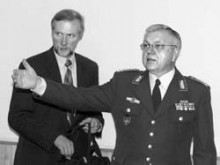NATO is marking its successful military cooperation with Ukraine. Concerns lest the alliance turn its back on Ukraine because of recent amendments to the Military Doctrine have proved wrong, evidence of which is the September 21 meeting of NATO and Ukrainian representatives. However, a new problem has emerged in the relationship between Brussels and Kyiv, this time in the sphere of air transport services.
HISTORIC SIGNALS
“This is a historic event and an important signal,” said NATO Military Committee Chairman Harald Kujat, referring to the September 21 meeting of the Ukraine- NATO Military Committee. The historic significance of this meeting is due to the fact that Kyiv was hosting talks of this kind for the first time. Before that, only Brussels hosted such meetings. “This was no ordinary meeting for exchanging pleasantries. We held a real working meeting that addressed the most relevant issues,” Kujat said. The talks were “a success because we received a large amount of information from the Ukrainian side.” NATO General Kujat said that the meeting heard an intermediate report on the progress of the 2004 Action Plan of the Ukraine-NATO Committee. “This report is frank, straightforward, and rich in facts. So we were very well disposed to all this information,” Kujat stressed. He also said that both parties discussed the draft action plan for 2005, which is to be revised before its endorsement during the November 16 meeting of chiefs of staff of NATO member states and Ukraine. “We discussed the lessons that we still must draw and derive certain conclusions from them,” he noted.
Ukraine’s defense reform dominated the talks. While pointing to the difficulties that Ukraine faces in implementing the reform, General Kujat expressed his approval of the reform processes in the Ukrainian army. “We should stress that the long-term reform plan is a healthy one. We can see what is happening in terms of military budget restructuring and how the money, which before was mostly used to finance current costs and support the Armed Forces, is gradually being redirected toward the training of personnel and acquiring contemporary armament systems,” General Kujat said. In his view, “this is the route that the armed forces of all Western countries have taken.” “It is a complex and painful process, but the issue is correct,” he added. General Kujat said that the alliance is ready to further support Ukraine in this, noting that the reform process “requires support from Ukrainian society in general, rank-and-file citizens, parliament, and the government.”
PLANES COME FIRST
However, a problem has emerged in the relationship between Ukraine and NATO, which requires an urgent solution. Kyiv’s cooperation with Brussels in the sphere of air transport services has come under threat. The alliance is using Ukrainian Ruslan aircraft to transport its cargo. However, the latest reports suggest that NATO has decided against involving Ukraine in strategic shipments because of a recent string of incidents in which Ukrainian planes were impounded abroad. Chief Designer of Ukraine’s Antonov Design Bureau Petro Balabuyev recently announced that NATO has decided against using Ukrainian aircraft until the situation with the impounded Ruslans is resolved. It will be recalled that the ruling by the Stockholm Court of Arbitration on a lawsuit brought by the Cypriot company TMP Energy, which wants to recover $41 million owed by Ukraine, has been recognized by the US, Canada, France, Germany, Italy, Belgium, Holland, and Israel. One Ukrainian Ruslan was impounded in Canada in 2003 and remains there pending a court ruling. Another Ruslan was impounded on August 18 in Belgium.
“NATO has not approved any official decisions to suspend cooperation with Ukraine in the sphere of air transport services,” NATO Spokesman James Appathurai said in an interview with The Day. He noted, however, that in view of the recent difficulties connected with these impoundings, the participation of Ukrainian planes in cargo transportation might be suspended. Mr. Appathurai added that Ukraine is not the exclusive carrier of the alliance, which cooperates with air carriers from different countries. At the same time he stressed that NATO has not raised the issue of not using Ukrainian planes at all. It is obvious that the alliance finds the crisis with Ukrainian Ruslans unpleasant, because it is damaging to the partnership of the two parties in general. The resolution of this crisis is critical to the reputation of both Ukraine and NATO, as the latter was counting on Ukraine to fulfill the trust accorded it.
So far it seems that this trust has not been exhausted. On September 20, the NATO delegation headed by General Harald Kujat visited the Antonov Design Bureau. As The Day learned from Michelle Durres, director of the NATO Information and Documentation Center in Ukraine, the delegation viewed a display of modern Ukrainian planes. “The NATO representatives were very impressed by what they saw,” he noted. NATO’s positive signals are especially important to Kyiv today. Now it is Ukraine’s turn to make the next move.







